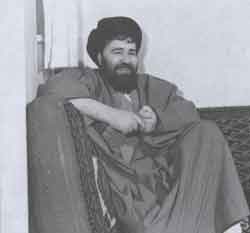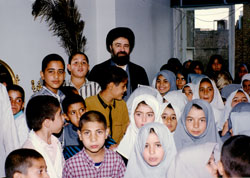It has been proven that genetic and heretic factors affect the spiritual and psychological aspect of a child. Thus the environment in which a child grows up in and his mother and father will greatly affect his character. This has been an Islamic belief for centuries. Imam Khomeini was a true role model and represented how a true Muslim should act. These high morals and good characteristics obviously influenced his son Sayyid Ahmad and were a part of who he was.

Sayyid Ahmad was a sociable and cheerful person. He only showed his anger when he dealt with the enemies of the revolution and the Imam. He was also a very generous and forgiving person and never held grudges, even against those who had been very rude or disrespectful to him. If he found out that his behavior or something he had said had even slightly upset someone, he would apologize in person or in writing. Although he was the Imam’s son he was never arrogant. Furthermore even though he was self-assured and confident at the same time he was a humble person. He was truly of the view that the people are the owners of the revolution and they were the ones who sacrificed a great deal to achieve an Islamic republic. He always thought of the people when making decisions. He called himself the people’s servant and repeatedly said that I am proud to be the people’s servant. It upset him to see people, who were in the government and felt they were in a position of power rather than they were there to serve people. Having followed the example of the Imam, he lived a very simple life, free of materialism.
Sayyid Ahmad had many outstanding qualities and they were known to all as he was in the public eye. He hated luxuries and formalities of any sort, and if he had to be present in a lavish gathering he would feel suffocated. When he left his house he never had bodyguards or any form of security protecting him apart from a few cases, where he had no other choice. He always used his own ordinary car when he wanted to go places. Although he could have used the status he had to own a house, he never did, and throughout his life he lived in a rental house. He preferred to socialize with those who had meager finances rather than the rich and repeatedly said that I prefer a single hair of those living down town to that of one hundred rich men.
The Imam’s younger son paid great attention to the needy and tried to help them in every way possible. Many of his friends recall that he believed that no affair was more obligatory than helping out the needy. He would also say if one is after comfort in the hereafter, one must be ‘good’. When questioned what he meant by ‘good’, he replied: “A good person is not one who just remembers God; rather he is one who solves people’s problems while carrying out his own religious obligations.” Although Sayyid Ahmad wasn’t a wealthy man, he still did his utmost to help the needy.
Sayyid Ahmad always visited the sick and his relatives, showed the utmost respect to his parents, paid great attention to his children’s education and upbringing, respected and helped his wife, shunned cultures which were not Islamic, and carried out all his religious duties. He truly felt indebted to those who had lost a member of their family for the revolution and respected them. He was compassionate and when people spoke to him they felt as if they could tell him anything. He was a trustworthy and very loyal man.

He was a great follower of the fourteen infallibles. He cried openly during sessions which mourned the loss of the infallibles. After the Imam’s passing, one always sensed there was sadness in him, even when he was joyful or happy. This can be clearly seen in pictures taken of him after the Imam’s demise. He was always worried that the different opinions between the people would bring disunity and dispersion, and was of the view that as long as different political beliefs and ideologies were loyal to the Wilayat-e-Fagih, the revolution would live on.
Like the Imam, he was a brave man and voiced his opinions openly. He supported freedom of choice and maintained that if a culture of censorship and conservatism spread throughout Iran many problems would surface. He also insisted that the two leading groups of clergymen and academics need to work with each other, otherwise indifference, anger, lack of cooperation with the government and dissatisfaction would spread among the people. Under such dangerous circumstances, opportunists and hypocrites would get through the back door and take the lead, and this would result in the destruction of the revolution’s principles.
During the last two years of his life Sayyid Ahmad decided to live a quieter life, which he had always preferred. Every now and then he would go to a house he had in Kushk-e Nusrat, which is a region situated between Qom and Tehran. There he busied himself with prayer and worshipping God, and studied the Imams books. He did not wish to be disturbed there, but insisted that if anyone had any question regarding the Imam’s books they should feel free to come and question him and shouldn’t hesitate in doing so.